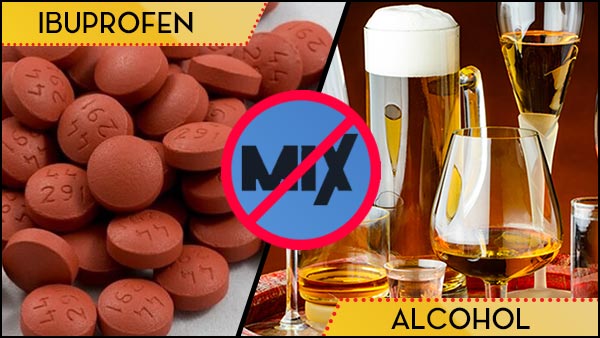Let’s Discuss Ibuprofen and alcohol. Most of us are aware that we shouldn’t mix prescribed medications with alcohol as the effect can often be life threatening.
But what about over the counter medicines? Are they safe, or just as dangerous? We take a closer look at the dangers of mixing Ibuprofen and alcohol.
What Is Ibuprofen?
Ibuprofen is a commonly used over the counter painkiller that can be found in most households. It can be used to lower fevers and relieve pain from conditions such as arthritis.
It’s classed as a non-steroidal anti-inflammatory medication and the manufacturers advise you to take it with food.
Advil, Midol, and Motrin are all versions of Ibuprofen so they produce the same benefits and negative side effects. It works by blocking the production of prostaglandins in your body. They are your body’s reaction to injury and illness and they cause swelling and pain.
Ibuprofen comes in tablet, spray, or gel form and usually takes care of pain relatively quickly. However, it can take longer for swelling to disappear.
Because of possible side effects on the stomach, it’s advised that you don’t take Ibuprofen if you have heart disease or have a peptic ulcer. They also advise that if you have kidney or liver problems or asthma, you should take this medication with caution.
What Are the Known Ibuprofen Side Effects?
Side effects may be experienced when you take Ibuprofen, but they should not last for long.
If you’re taking Ibuprofen and you have any problems with your breathing, chest pain, or slurred speech, you should seek medical attention immediately.
Side effects from ibuprofen can include:
- Dyspepsia
- Stomach pain and inflammation
- Nausea and/or dizziness
- Vomiting
- Diarrhea
- Hypertension
- Digestive ulcers
Also, Ibuprofen doesn’t react well with aspirin, lithium, and some medications normally prescribed for high blood pressure.
What Are the Risks of Making a Painkiller Drink of Ibuprofen and Alcohol?
Much like the effects of mixing aspirin and alcohol, the risks of mixing Ibuprofen with alcohol can lead to long-term problems.
- Gastrointestinal Bleeding: Ibuprofen can be harsh on your stomach which is why you are advised to take it with food. When you mix it regularly with alcohol, you increase your risk of damage caused by gastrointestinal bleeding. Symptoms of this can include black tarlike stools, stomach upsets, and blood in vomit.
- Kidney Damage:this is another serious risk when you mix Ibuprofen and alcohol regularly. Symptoms of kidney damage include shortness of breath and swelling in the hands, feet, and ankles.
- Drowsiness and Accidents: these two substances taken together may cause drowsiness which can be problematic on its own. However, that drowsiness can also lead to a higher risk of injury and accidents.
- Other PhysicalProblems: Mixing Ibuprofen and alcohol can weaken the effectiveness of other medications.
- Less Effective Medication:Taking certain medications with alcohol can make them less effective and may even exacerbate side effects.
Is Ibuprofen a Blood Thinner?
Ibuprofen slows down the blood clotting process which is one of the reasons you shouldn’t take it with Aspirin, as it too, acts as a blood thinner. This means that a minor injury can have serious repercussions.
Mixing Ibuprofen and alcohol together is never advisable.













